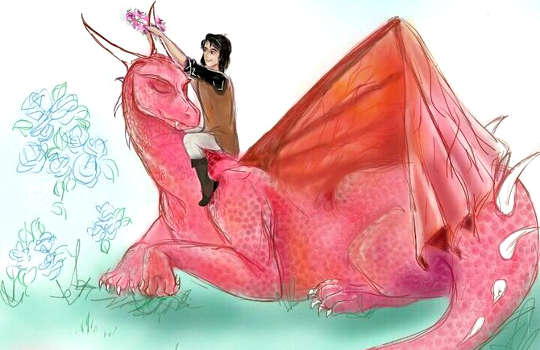
Art Credit: Thorn Amongst the Roses by Jonairadsylva. (cc 3.0)
Empathy is essential to good relationships. When we are able to appreciate another’s actual experience, we don’t rely on our distorted projection of their motives; we go directly to the source without confusing the situation with our own fears and defensiveness.
When we actually imagine looking from another’s eyes, we begin to appreciate their feelings and insights that are independent of us. We gain compassion for their vulnerability and receive new information about what isn’t working and how we could be different in the relationship. This information is critical to acting in new ways. It gets simple when we move out of our egocentric rationalizations and allow ourselves to receive others’ feelings.
Gaining Insights Through Another’s Perspective
When you look at yourself through another’s perspective, you gain insights not normally available. When my son was interviewing for a summer job during high school, it wasn’t going well. To get a sense of what wasn’t working, I suggested he close his eyes and imagine looking from the perspective of the job interviewer. Shocked, he saw himself as a timid, hesitant teen. He didn’t feel insecure, but his body reflected his inexperience.
Once he saw the specific problem, he could correct it. Now he could speak with confidence instead. When he could close his eyes and see himself this way, he knew he was ready. The result: he earned a very responsible job that paid more than he expected and looked great on his résumé.
Locating And Rewiring An Original Problematic Event
Another benefit of seeing how we look through another’s perspective is that it allows us to locate and rewire an original problematic event and gain healing and behavioral change; it happens in the body at the site where the emotion is stored.
Justin is a successful organizational consultant with twin sons in high school. When he became a single dad, effective parenting was important to him. He had grown up in a traditional family with an extremely domineering father. When Justin looks from his sons’ perspective, he sees the same paternal behaviors he hated in his own upbringing.
As Justin goes back in time [in his imagination] and speaks to his father, he releases a mountain of smoldering rage. As he bridges a new emotional connection with his dad, he realizes it’s never too late. Using his regenerated father-son connection as a model, he enacts a close, playful relationship with his sons that grows more enjoyable through their high school and college years.
Embracing and Transforming Our Ugliness
When we’re willing to embrace our ugliness, we transform. Many people automatically look and behave differently after doing this depth of inner work. Going beneath talk to direct experience, we immediately record new images in emotional memory, resulting in different spontaneous behaviors.
A middle-aged anesthesiologist uncovered hidden sorrow held over from third grade, when she had returned to school from a prolonged illness and found her best friend had replaced her. Looking at this experience through her friend’s eyes, she discovered she never shared her hurt feelings (a pattern in her marriage, too). After acknowledging her feelings aloud to herself and her friend during RIM (Regenerating Images in Memory), she got a different outcome emotionally and physically. She commented a few weeks later:
I had a strange experience. I’ve been going to yoga class with my best friend for six years. I never talk during class except to her. At the end of this week’s class, I realized I’d initiated three spontaneous conversations with other women. It was so much fun, and I wasn’t even thinking about it.
When the source experience is rewired, we see everything differently. The magic of organically clearing human self-consciousness allows a quick return to childlike joy and curiosity, which naturally express as a sparkle in the eyes.
Realizing New Choices
When we look deep within and recognize hidden feelings and their effects, a new world of possibility opens. We can make insightful choices rather than emotionally driven ones.
Numerous people have discovered through RIM journeys that a chronic health symptom/illness is highlighting their choices. Rosie is extremely distressed after being diagnosed with type 2 diabetes. When she asks her imagination for an image to represent the diabetes, a huge spider named Harry appears.
Harry’s gargantuan size and fierce appearance cause Rosie to shrink in her chair. Harry speaks: “I’m here to help you take better care of your body. If you take care of yourself, you’ll live a normal, long life.” As he speaks, he shrinks to normal size and seems more “friendly.”
Rosie is a nurse, so she knows he’s right and says to him: “Harry, I feel you are my friend and you’re helping me live a healthier life. Thank you. Let’s communicate directly each day when I first wake up and go to bed, so I know how I’m doing. I know you’ll be honest with me so I can’t fool myself.”
Rosie demonstrates how life experiences that initially appear scary and ugly can turn out to be a friendly support that helps us take better care of ourselves.
A Return to Inherent Joy
Embracing ugly feelings causes them to die away to reveal natural states of peace and love. Some people even find their way to great revelations.
Josh is a twenty-eight-year-old Israeli man who does a Skype session because he is feeling called to inspire others through speaking rather than through his paintings, which have provided his livelihood up to this point. As he follows his body sensations, he finds an energetic block in his chest and throat. He moves into it, and senses an experience he had at four years old when his mom becomes very irritated with him for bringing yogurt instead of butter to the dinner table. The sensitive little boy feels very hurt when shamed for this innocent mistake and speaks to her about his feelings.
As he moves to look out of his mom’s eyes, he senses great insecurity in her body. When he asks for an image of the source of it, scenes from the Holocaust come rushing in. His virtual mentor Jesus lifts him to view the Holocaust from above. The graphic scenes are horrific, and Josh sobs and writhes in emotional pain. With Jesus supporting him, he grieves this historic loss of innocence. The feelings flow intensely until he eventually reaches a place of emptiness where there is communication without words from Jesus, and Josh accepts that it happened yet can’t be explained.
As the grief completes its course, his awareness reminds him of a recent incident when Israelis burned a live baby. He feels intense sadness for the Palestinians and especially the parents of this baby. After the session ends, he makes a video apology to the Palestinians in Arabic on YouTube and acknowledges that there is no excuse for Israelis to kill in this way, regardless of what others have done to them. He feels changed and ready to continue stepping into his new career goal.
Ugly Feelings Lead to Greater Love and Awareness
A rose is a great metaphor for the nature of emotion. The aesthetic beauty of the blossom with its velvety texture and sweet scent can be appreciated only at the risk of braving the thorns. Gardeners consider the thorn a practical protection from animals and humans, and the Greeks have a proverb to express their integral relationship: “From a thorn comes a rose, and from a rose comes a thorn.”
Abraham Lincoln insightfully suggested: “We can complain because rose bushes have thorns, or rejoice because thorn bushes have roses.” Similarly, we can complain because life has ugly feelings, or we can appreciate them as catalysts to greater love and compassion.
Practice RIM (Regenerating Images in Memory)
Seeing Yourself through Another’s Perspective Activity
- Find a quiet, private space and settle into it.
- Closing your eyes, take whatever time you need to relax as your attention settles into your belly and senses the inside of your body like a 3-D movie.
- Imagine breathing in through your navel and out through the small of your back for several minutes until you feel very relaxed. Soft music without lyrics may be helpful.
- Imagine a magical screen in front of you, where your imagination flashes a picture or name of a person whom you need to hear from. Receive whoever shows up, letting go of any urge to edit.
- As you receive this image, notice who it is and how this person looks. Notice how you feel as you see this person.
- Moving your attention into this person, look out of his/her eyes. Through these eyes, look over at yourself and sense how you appear. Continuing to gaze from this other’s perspective, sense this person’s inner feelings and thoughts about you and relationship with you. Using these sentence leads, speak further for this person:
- What I haven’t told you that you need to know (your name) is ...
- What I’ve been hiding is . . . because ...
- What I need from you is . . . because ...
- What I love most about you is ...
- My wish for our relationship is ...
- What else wants to be spoken is ...
- How it feels to speak this to you is ...
- Returning your attention to yourself, look out of your own eyes at the person and notice how this person appears different now. Notice how you feel after sensing this person’s inner feelings. If you want, speak/write to this person. Go ahead and express whatever else wants to be voiced, beginning with “As I hear you, I feel . . .” In the RIM process, you always get the last word.
- Take some time to record or verbally share your experience. New thoughts and awarenesses continue to arise as you write and speak about it.
Feelings are the foundation of your mood
Which is the attitude of your days,
Which inspires a way of life
Which generates feelings
And so it goes . . .
Subtitles added by InnerSelf.
©2016 by Deborah Sandella. All rights reserved.
Reprinted with permission of the publisher, Conari Press,
an imprint of Red Wheel/Weiser, LLC. www.redwheelweiser.com.
Article Source
Goodbye, Hurt & Pain: 7 Simple Steps for Health, Love, and Success
by Deborah Sandella PhD RN.
 Deborah Sandella uses cutting-edge neuroscience research and her revolutionary Regenerating Images in Memory (RIM) technique to show how blocked feelings prevent us from getting what we want, and she introduces a process that bypasses logic and thinking to activate our own emotional “self-cleaning oven.”
Deborah Sandella uses cutting-edge neuroscience research and her revolutionary Regenerating Images in Memory (RIM) technique to show how blocked feelings prevent us from getting what we want, and she introduces a process that bypasses logic and thinking to activate our own emotional “self-cleaning oven.”
Click here for more info and/or to order this book.
About the Author
 Dr. Deborah Sandella has been helping thousands of people find themselves for 40 years as an award-winning psychotherapist, university professor, and originator of the groundbreaking RIM Method. She has been acknowledged with numerous professional awards including Outstanding Clinical Specialist, Research Excellence, and an EVVY Best Personal Growth Book Award. She is the co-author with Jack Canfield of Awakening Power. Photo credit: Doug Ellis. For more info, visit Author's Website.
Dr. Deborah Sandella has been helping thousands of people find themselves for 40 years as an award-winning psychotherapist, university professor, and originator of the groundbreaking RIM Method. She has been acknowledged with numerous professional awards including Outstanding Clinical Specialist, Research Excellence, and an EVVY Best Personal Growth Book Award. She is the co-author with Jack Canfield of Awakening Power. Photo credit: Doug Ellis. For more info, visit Author's Website.
Related Books
at InnerSelf Market and Amazon

























